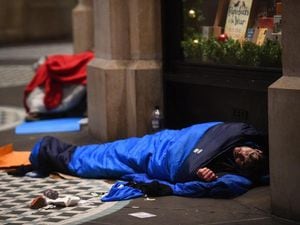Spending on help for single homeless people plummets in the West Midlands
Spending on services for single homeless people in the West Midlands has been slashed by 59 per cent in the last nine years, according to a new report.

Research commissioned by the St Mungo’s and Homeless Link charities found that local authorities across the country now spend nearly £1 billion less a year on services compared with 10 years ago.
The charities say the shortfall is down to Government funding cuts, and warn that many people have been left with no other option but to sleep rough.
They say that overall, more than £5bn less has been spent on services for single homeless people than would have been spent had funding continued at 2008-09 levels.
During the same period, homelessness in England has risen dramatically, with the number of people sleeping rough now 165 per cent higher than it was in 2010.
Single people and couples without children are the least likely to have a legal right to be housed by their council and so are the most likely to end up sleeping on the streets, the report says.
It also warns that support for this group is “crucial” to help them find and keep accommodation and cope with the various problems that may be contributing to their homelessness, including poor mental health, substance use and domestic abuse.
Struggling
Until 2009, the Government-funded Supporting People programme provided councils with ring-fenced funding for people struggling to live independently.
Data from Homeless Link shows a 30 per cent fall in the number of bed spaces in accommodation projects for single homeless people, including hostels, which have dropped from an estimated 50,000 in 2008 to 35,000 in 2017.
Although the Government’s Rough Sleeping Strategy – a grant of £10m from 2016-17 to 2018-19 – has provided welcome additional funding for homelessness services, it falls short of replacing the lost funding identified in this research, the charities said.
Howard Sinclair, chief executive of St Mungo’s, said the report’s findings should provide a “wake-up call” for ministers.
“Councils have a crucial role to play in preventing and reducing homelessness and rough sleeping, but years of cuts have left them struggling to tackle rising homelessness with fewer and fewer resources,” he said. “The human cost of these cuts is all too real. The people we work with – many struggling with poor mental health, substance use or domestic violence – are often being left with no option but to sleep rough.
“With nearly 600 people dying on our streets or while homeless in a year, this really is a matter of life and death.”





